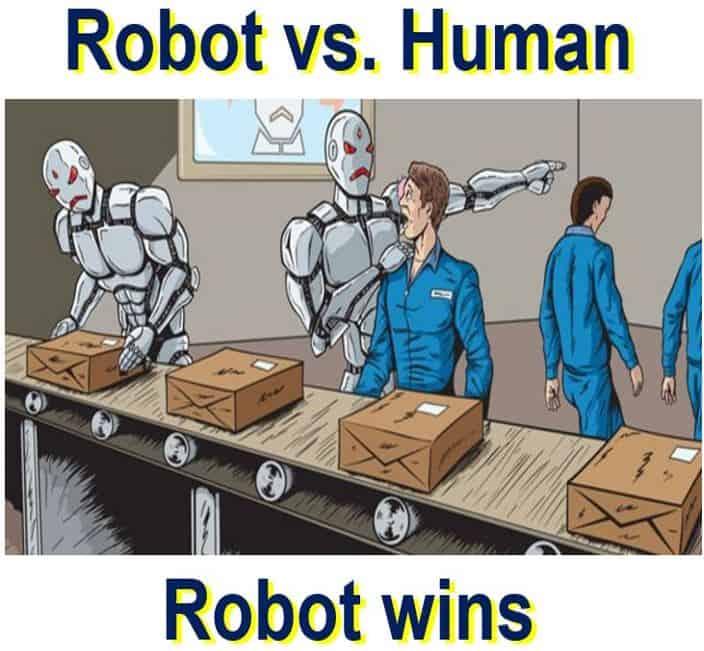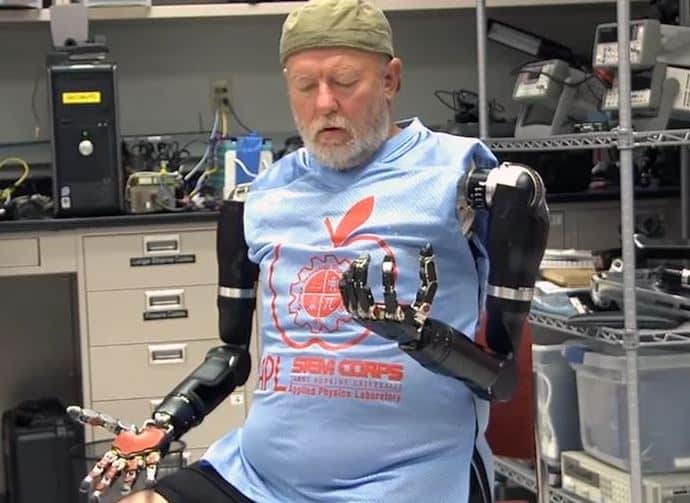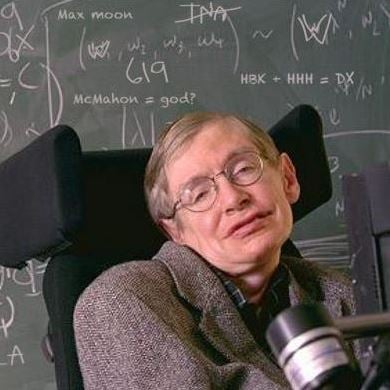Imagine a world full of smart robots that can do any job a human can – there would be mega global unemployment with potentially dire consequences for society. Computer scientist Moshe Vardi, believes this will happen within the next three decades.
Not only will robots equipped with sophisticated artificial intelligence be able to do most jobs we can, they will probably be better at them. They will not need sleep, if their programming is done properly, they will not get tired or angry and make mistakes like we do.
Robots do as they are told, they do not go on strike, ask for salaries, sexually harass other employees resulting in expensive lawsuits, have babies and then ask for time off, get involved in office politics and time-wasting rivalry or brinkmanship, get ill and then ask for time off, they don’t even need health or unemployment insurance – it is a very long list!
 What will happen to us when robots take over most jobs currently occupied by humans and the unemployment rate shoots to above 50%? Will we thrive in a life of leisure?
What will happen to us when robots take over most jobs currently occupied by humans and the unemployment rate shoots to above 50%? Will we thrive in a life of leisure?
Imagine billions of humans living a life of leisure!
Prof. Vardi, Distinguished Service Professor in Computational Engineering at Rice’s Department of Computer Science, is today urging computer experts, sociologists and other professionals and policymakers to consider the societal implications of a labour force dominated by robots, and a massive proportion of our physically active and able population without work.
Can our current societies across the world cope with an unemployment rate greater than 50%? Will people of working age be happy to live a life of leisure? Even if we manage to be happy, would we be physically and mentally healthy?
What is a robot?
Since humans first set foot on this planet, we have been used to going out to gather and hunt, later as farmers to tend to our livestock and crops, and since the industrial revolution to play a useful role within the vast spectrum of the world’s labour force.
Work is in our genes, isn’t it?
We may be genetically programmed to work. How would an intelligent, sophisticated animal – a human – exist without work?
Prof. Vardi, who is also Director of the Ken Kennedy Institute for Information Technology, said:
“We are approaching a time when machines will be able to outperform humans at almost any task.”
“I believe that society needs to confront this question before it is upon us: If machines are capable of doing almost any work humans can do, what will humans do?”
 Will a life of leisure be a dream-come-true for most humans?
Will a life of leisure be a dream-come-true for most humans?
This will be the theme of Prof. Vardi’s presentation at the annual meeting of the American Association for the Advancement of Science in Washington, D.C. at 8am on Sunday, 14th February, 2016.
Will ultra-smart robots benefit us?
Regarding artificial intelligence and its pros and cons for humankind, Prof. Vardi said:
“The question I want to put forward is, ‘Does the technology we are developing ultimately benefit mankind?’”
He will provide compelling evidence showing how rapidly the pace of advancement in the field of AI (artificial intelligence) is increasing.
The phenomenon has already begun, he explains. AI technologies are today eliminating an ever-increasing number of middle-class jobs, and consequently fueling income inequality.
Prof. Vardi, who is both a member of the National Academy of Science and the National Academy of Engineering, has served as the editor-in-chief of Communications of the ACM, the Association for Computing Machinery’s flagship publication.
Automation has been well received … so far
Since the dawn of the industrial revolution, most of us have seen automation as a good thing that has benefitted society and improved out quality of life. Likewise, the majority of humans today believe future advances in automation, which includes increasingly smarter robots, will also be good for us, Prof. Vardi explains.
 Perhaps a life of leisure will be a living hell – the ultimate nightmare – for many of us.
Perhaps a life of leisure will be a living hell – the ultimate nightmare – for many of us.
Regarding automation, Prof. Vardi says:
“A typical answer is that if machines will do all our work, we will be free to pursue leisure activities.”
Even if we manage by some miracle to reorganize society and our economies to enable billions of people to live lives of leisure, Prof. Vardi still wonders whether automation would ultimately be good for us.
He made the following comment regarding humans and our need for work:
“I do not find this a promising future, as I do not find the prospect of leisure-only life appealing. I believe that work is essential to human well-being.”
“Humanity is about to face perhaps its greatest challenge ever, which is finding meaning in life after the end of ‘In the sweat of thy face shalt thou eat bread.’ We need to rise to the occasion and meet this challenge [before human labor becomes obsolete].”
 Some people, like amputee Leslie Baugh, have no doubt that sophisticated artificial intelligence is and will be a blessing. In this picture, Leslie is operating two prosthetic arms just by thinking about moving them. Imagine what will be available for people like him in fifty years’ time, (Image: Johns Hopkins University Applied Physics Laboratory)
Some people, like amputee Leslie Baugh, have no doubt that sophisticated artificial intelligence is and will be a blessing. In this picture, Leslie is operating two prosthetic arms just by thinking about moving them. Imagine what will be available for people like him in fifty years’ time, (Image: Johns Hopkins University Applied Physics Laboratory)
The Leverhulme Centre for the Future of Intelligence
In December 2015, the University of Cambridge announced it was opening The Leverhulme Centre for the Future of Intelligence, which will be tasked with analyzing current and future artificial intelligence and determining whether it is or will be a benefit for humankind – or a nightmare, and if so, what we can do about it.
Thanks to a £10 million donation from the Leverhulme Trust, the new centre will explore the opportunities and challenges that AI will bring to us.
Cambridge scientists say that even though computer science is advancing at lightning speed, so far we have only started scratching at the surface of AI, which will soon have the ability to analyse, learn and update without our help, i.e. evolve on its own.
The Centre will bring together IT experts, philosophers, psychologists, anthropologists, social scientists and other specialists to study and discuss the practical, technical, ethical and philosophical questions that AI will raise for all of us in the years to come.
Huw Price, the Bertrand Russell Professor of Philosophy at Cambridge, who will be the Director of the new centre, said:
“Machine intelligence will be one of the defining themes of our century, and the challenges of ensuring that we make good use of its opportunities are ones we all face together.”
“Humans have barely begun to consider its ramifications – good or bad. The Centre is a response to the Leverhulme Trust’s call for ‘bold, disruptive thinking, capable of creating a step-change in our understanding.’”
When will robots outsmart us?
When will robots outsmart us and leave us behind in the evolutionary ladder? Scientists are not sure – they say it is impossible to predict when a human-level AI will be created.
Virtually all of them are certain it is going to happen before the end of this century.
As soon as an intelligent AI learns to upgrade itself, its evolution will start speeding up dramatically. In other words, if it upgrades by a certain degree every six months, that degree of advancement will double during each six-month period, or the intervals will halve each time.
Eventually, there will be an AI that has the ability to judge and, like us, have the will to survive.
 Prof. Stephen Hawking fears what AI may represent for humans one day. Some people find his opinion surprising, given that people with motor neurone disease (also called ALS) are likely to have much better mobility one day thanks to AI. (Image: hawking.org.uk)
Prof. Stephen Hawking fears what AI may represent for humans one day. Some people find his opinion surprising, given that people with motor neurone disease (also called ALS) are likely to have much better mobility one day thanks to AI. (Image: hawking.org.uk)
Stephen Hawking fears AI’s potential
Eminent theoretical physicist, cosmologist and author Prof. Stephen Hawking has warned us on several occasions about the potential dangers of AI in the future. It will be able to evolve much faster than we can biologically.
Prof. Hawking wonders whether AI could spell the end of civilization as we know it, and even perhaps the extinction of the human race.
Prof. Hawking once said: “The development of full artificial intelligence could spell the end of the human race.”
“When it eventually does occur [AI becomes smarter than humans], it’s likely to be either the best or worst thing ever to happen to humanity, so there’s huge value in getting it right.”
Video – Artificial Intelligence
AI or Artificial Intelligence refers to software that makes robots and other machines ‘intelligent.’ Specifically, the way they behave and think is similar to that of humans.
